Gender in Chess… the long and Short of it
Since 2012 I have done a review of each issue of New in Chess (NIC), a premier Dutch magazine. When I received my New in Chess a month ago, I was pleased to see Hikaru Nakamura as the cover story as well as the Tata Steel coverage. The issue included a Carlsen interview and there was coverage on the Filipino phenom of Wesley So playing in his first tournament under the U.S. federation.
This issue was more of the same excellence I have come to expect from New in Chess. Then I get to the Nigel Short article which I always make a point to read. No sooner than I read the opening of the article and the Jan Hein Donner quote, I knew then that it would be an explosive one. The only thing missing was the Bobby Fischer “knight odds” quote.
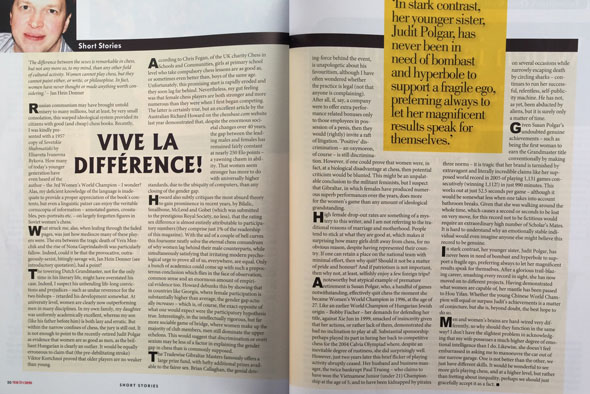
The layout of Nigel Short’s polemic article in the 2015/2 issue of New in Chess.
On August 19th, here is an excerpt of what I wrote about Short’s article…
Nigel Short has a way of ruffling feathers and seems to relish the opportunity. It remains to be seen what the response will be. In his “Viva La Difference” he discusses the men-women disparity in chess skill. (see article)
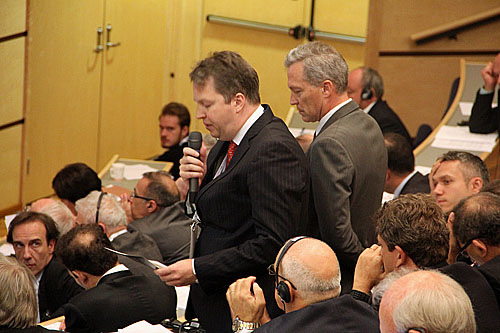
Nigel Short has a history of “stirring the pot”. Here he is pictured questioning the FIDE/AGON agreement at the FIDE General Assembly in Tromso Olympiad in Norway. Photo by Daaim Shabazz.
The subject is not new and Short does not make any revelations… so I thought. Besides, the New in Chess issue had been out for a month and I had not seen any commentary about this article in either the chess media or mainstream media. There is no way of knowing 100% if my short review played any role in giving attention to Short’s article, but on August 19th and 20th I started receiving e-mail and text messages on articles excoriating Short’s essay as sexist and vile. Of course I had read the article and decided to see exactly what they were saying about his piece.
I noticed that many of the articles had affixed dubious and inaccurate titles to their stories. Titles such as the Telegraph’s “Girls just don’t have the brains to play chess,” and “Women aren’t smart enough to play chess”. Another stated that Short said that women do not have the logic to play well. This immediately told me that these writers either did not read the article or missed the point entirely. Maybe they were miffed by his last paragraph.
Men and women’s brains are hard-wired very differently, so why should they function in the same way? I don’t have the slightest problem in acknowledging that my wife possesses a much higher degree of emotional intelligence than I do. Likewise, she doesn’t feel embarrassed in asking me to manoeuvre the car out of our narrow garage. One is not better than the other, we just have different skills. It would be wonderful to see more girls playing chess, and at a higher level, but rather than fretting about inequality, perhaps we should just gracefully accept it as a fact.
~GM Nigel Short
Of course I have participated in such debates and have also been asked similar questions as to why there have not been more players of African descent (worldwide) who have reached Grandmaster level. In my 14 years of running The Chess Drum, I have received a few racist notes such as, “Chess is for Whites Only” and one memorable post at the white supremacist website Stormfront stating that Blacks were not smart enough to be chess Grandmasters. I have written on this issue as well. It turns that some of these issues are similar in the gender debate.
Some months ago, I remember talking to Adia Onyango who has a 1900 USCF rating and is among the top 100 women in the U.S. We discussed the retention of girls in chess and possibly collaborating on an empirical study for Journal of Chess Research about the problem. It would be a serious and timely study, but a conceptual framework is needed. There are many angles in the gender debate and while there is no empirical data to present here, I will examine the following issues.
The Intelligence Argument
Did Nigel Short actually say that girls do not have the brains to play chess? Of course not. Many kept pointing to his -5 score (+3-8=5) against Judit Polgar as an example that women are capable of strong play, but this has little to do with his overall point that there exists a wide strength gap between men and women. He did not mention the word “brain” until the last paragraph, one he surely could have nixed altogether.
Some psychologists have presented data showing that chess is NOT a game of raw intelligence. Dr. Sheng He of the University of Minneapolis did a study to show “The board games chess and go take practice, not intellect, brain scans of players suggest. Intelligence areas appear inactive when people puzzle over game strategy.” The argument is that chess requires more use of cognition and spatial processing than raw intellect. This study was conducted using positron emission tomography (PET) scans of various parts of the brain during play.

Differences between the brains of men and women are well-documented.
Does that constitute the difference in chess ability?
Even if you did accept that chess as a purely intellectual endeavor, does the fact that there are fewer women who have reached the upper echelon prove that they are intellectually inferior? It would be hard to prove this, but many point to the numbers argument which will be discussed later. However, men’s and women’s brain do differ (in weight and chemistry) and that is a scientific fact. In addition, some theorists cite that hormonal dynamics play a role in how a player may face danger and tension in competition.
During the Women’s 2015 U.S. Championship two participants spoke on this issue and opined that there may be differences in a woman’s ability to maintain focus and stability during tense moments. There are even studies on how risk-aversion affects how each gender reacts when facing the opposite sex. So if “intelligence” is at play, perhaps it is the “emotional intelligence” that Short referred to in the article.
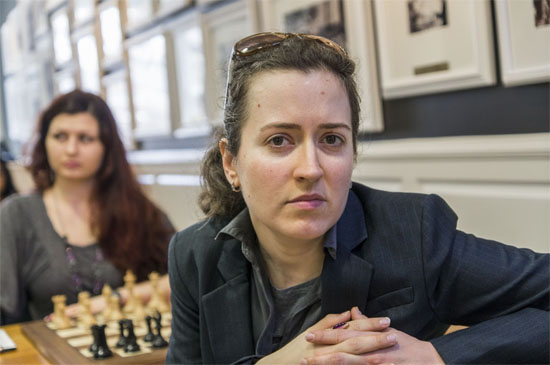
GM Irina Krush has spoken openly on the gender issue.
Photo by Lennart Ootes.
Back in 2008, IM Elisabeth Paehtz was quoted in a German source that women may lack the “killer instinct”. These same words were echoed by GM Irina Krush. Of course, none of this means that women are not intelligent enough to achieve chess success, but it may mean that different methods are needed in order to find the balance.
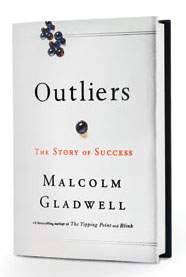
The one example that seems to be popular is that of Judit Polgar who is became a sensation demolishing the strongest competition in her teens. She eschewed playing in women’s competitions and became #8 in the world. She states unequivocally that her success was due to determination, confidence and focus along with playing the strongest competition, numbers notwithstanding.
Malcolm Gladwell’s “Outliers” discussed the 10,000 hours needed to master a skill. There is no question that Polgar is an outlier, but are we to believe that dogged determination is all that is needed to achieve 2700-level? There are undoubtedly other factors, but perhaps determination as just as or more important than talent.
The Sexism & Numbers Arguments
Some theorists believe that because there are fewer women in chess then the smaller pool produces fewer strong players. That may be true if you are drawing statistical samples from each group, but there are far more salient factors at play. In fact, Short discussed the attrition rate of girls as being part of the issue.
“High female drop-out rates are something of a mystery to this writer, and I am not referring to the traditional reasons of marriage and motherhood. People tend to stick at what they are good at, which makes it surprising how many girls drift away from chess, for no obvious reason, despite having represented their country.”
Of course, one of Short’s respondents WIM Sabrina Chevannes echoed the comments of many women when she cited the evidence of sexism in the male-dominated sport of chess. If fact, you will find many examples of sexist comments being made about female chess players on chess servers and Facebook pages and it is also reinforced in chess media by focusing on their physical attributes as opposed to their skills. This idea of a sexist environment may be as oblivious to some as a racist environment is to others. For some women, perhaps such an environment may be a deterrent.
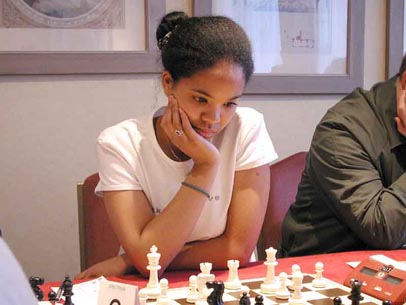
Sabrina Chevannes as a 13-year old phenom.
Copyright © 2001, Spectrum Chess.
.jpg)
Sabrina Chevannes representing England at the
2012 Chess Olympiad in Istanbul, Turkey.
Photo by Daaim Shabazz.
There are inherent stereotypes that girls and women face when they sit down and face an opponent, male or female. A study by Rothgerber and Wolsiefer concluded a “stereotype threat” may cause people to avoid the activities that are causing the threat. In other words, girls and women may shy away from chess because they are perceived to be “weaker”. A study by FM Meric Bilalic of Oxford University cited statistics as example,
“Bilalic describes the world’s top female player, Judit Polgar, as “a phenomenon, by far the strongest female player the world has ever known [and] the only female player in the top 100?. But according to Bilalic’s study, the exceptional thing about Polgar is not necessarily that she is an incredible female chess player, but that she is a female chess player at all. Increase female representation in this game and you would probably see many more prodigies rising to the fore.” (see article)
My view of this is that the gap is not merely statistical in nature. You have to control for other factors that may explain why there is a gap. In making it a statistical exercise, we would have to make a number of assumptions. Of course one cannot deny that seeing a larger number of females can play positive factor in confidence-building. However, if numbers were the main issue, one can argue there were fewer women playing during the rise of Judit Polgar. Yet she was able to become #8 in the world in spite of the low numbers.
What did Polgar do that other women have not done? Today, there are many more women holding the Grandmaster title, but unfortunately only four of them have crossed 2600-level chess (Judit Polgar, Hou Yifan, Humpy Koneru, Anna Muzychuk). There certainly are stronger women today, but according to Robert Howard, the strength gap has remained a constant 250 rating points. Magnus Carlsen is approaching the mythical 2900 barrier and several have eclipsed 2800. The top women still hover around 2500-2600 with Hou Yifan at 2686 (April 2015).
Men and women are different but there are different ways of thinking and fighting still achieving the same results 🙂 https://t.co/IPsiP8NJJ1
— Judit Polgar (@GMJuditPolgar) April 20, 2015
We must ask why today’s active, professional women have not achieved a higher standard. Numbers do not necessarily explain this. We have to examine subjects we can measure. We can measure Polgar’s path. We can measure Alexandra Kosteniuk’s path. We can measure Humpy Koneru’s path. What is different in the paths? It appears that in the case of Hou Yifan’s brilliance and near-2700 rating, she has improved since she began competing against stronger competition. Until recently, she competed amongst a pool of women in tournaments where the average strength is 2400-2600. Is progress a function of the pool of players that women are exposed to? Laszlo Polgar seems to think so.
The Polgar Experiment
The Polgar story is well-known by chess players. Laszlo Polgar decided to embark on a social experiment by homeschooling his daughters (Zsuzsa, Zsofia, Judit) and immerse them in a diet of intensive chess training, mathematics and foreign language training. There was a power in having the sisters support each other and all three of them became strong players.
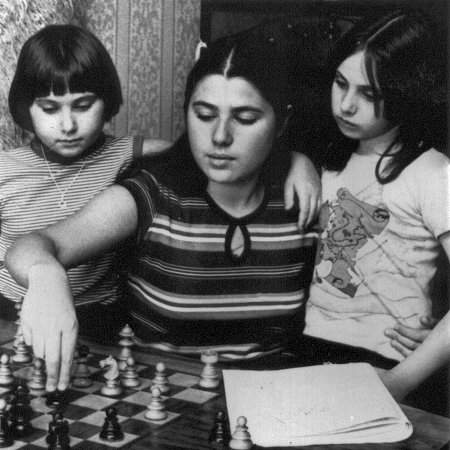
Judit, Zsuzsa and Zsofia Polgar studying games.
Zsuzsa, or now Susan Polgar became the world’s first woman to fulfill the three Grandmaster norms and rating requirement to earn the coveted GM title. For her sister Judit, she cut her teeth almost entirely on the toughest competition of the day crushing the elite Grandmaster in sensational fashion. Judit explained her success to Time magazine.
“I grew up in what was a male dominated sport, but my parents raised me and my sisters [to believe] that women are able to reach the same result as our male competitors if they get the right and the same possibilities,” Polgar told Time on Monday. (see article)
In this experiment, the social conditioning of the daughters had quite a different effect than the aforementioned “stereotype threat” that may have hampered the success of girls in chess, math and science. With girls, there are tremendous social pressures and chess is not one of those activities that traditionally results in enhanced social status among teens. On the other hand, boys have an almost fanatical zealotry when it comes to games whether it be bullet chess or solving the Rubix Cube in seconds.
In a Telegraph article in May 2014, Steve Barrett, a player for England’s White Rose team gave his take on this issue.
I guess it’s because chess isn’t perceived as being particularly cool as an activity and the age when you’re getting into chess, which these days is pretty young, cool matters,” he says. “When girls get to 12, 13, 14, they’re interested in other things. There aren’t so many role models for girls on the top level and it’s not considered a particularly cool activity even though it’s not as nerdy as it used to be. (see article)
To combat the social pressures, there have been many groups to aid female participation in chess. In fact, one advocate is Women’s Grandmaster Jennifer Shahade who was cited as saying that gender-based tournaments are helpful for many reasons.
All-girls tournaments allow participants to make friends, share hotel-room expenses, and compete in Open tournaments. So rather than take women away from mixed competition, I think they actually encourage them to compete in the end.” – 2-time Women’s US Chess Champion WGM Jennifer Shahade. (see article)
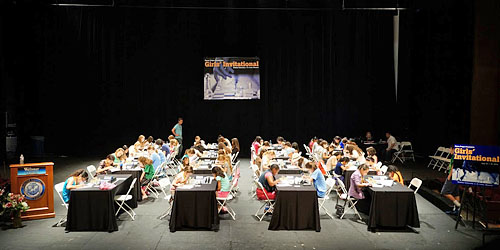
2014 Susan Polgar Girls’ Invitational
Photo by Paul Truong.
While the idea is to increase confidence levels and empowerment, some argue that such tournaments may isolate females and reinforce the “stereotype threat” that girls may not be on equal footing with boys. In the above Telegraph article, IM Malcolm Pein explains that Laszlo Polgar’s insistence that his daughters play in “men’s” tournaments was key.
It may sound sexist to believe that girls cannot be as good if they only play other girls, but it simply means that they will not improve if they are not engaged in playing the strongest competition. All three of the Polgar sisters were able to achieve the high standards of chess excellence. It is with a sense of irony that Short vociferously criticized Susan Polgar in his article.
Abolish Women’s Titles?
There are additional attempts to encourage women and one of the most controversial ways in the system of titles for women. They have adherents and detractors. Some of the adherents believe that the titles provide for motivation for girls to stick with the game and achieve realistic goals… even those who do not continue on. There also exists chess organizations with gender-based initiatives such as (i.e., 9 Queens, Polgar’s SPICE, Chess Girls DC). They are designed to serve as an incubation for building the requisite confidence for girls. However, it is important that girls do not get stuck in this incubation too long. Judit Polgar stated,
In fact, they must focus to play the best chess and not women’s chess and then they will improve faster. Unfortunately, most of them focus only on playing in women’s chess. (see article)
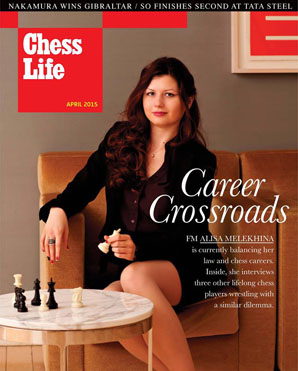
In addition, the idea of women’s titles has been ridiculed and some have mockingly advocated for titles for age, race and religion. Women’s titles were introduced in 1950 (WIM) and 1976 (WGM), but have been rejected by some of the women players. When I interviewed FM Alisa Melekhina after the 2014 World Open, she made clear that while she is a WIM, she prefers association to her FM title. Seven-time U.S. women’s champion GM Irina Krush has been on record in the Wall Street Journal saying that she doesn’t see the benefit. “Women’s titles are really a marker of lower expectations,” she was quoted as saying. (see article)
There is also the incongruence of titles awarded where players with the WGM title can hold either 1800 or 2500 rating. Nevertheless, there has to be a better way to incentivize chess besides offering gender-specific titles. The idea of offering separate prizes has long been seen as a way to attract women. However, the idea of separate women’s tournament is a double-edged sword. It provides more opportunities and perhaps allows women to stay engaged. Unfortunately, some women become dependent on these as a main source of competition and never get a taste of stronger competition.
What’s Next?
Nigel Short’s essay on these gender differences is not original, but it is a topic that needs to be discussed. I personally believe that his attack on Susan Polgar was unnecessary in the context of the article and may have steered the attention away from the main thesis which is the strength gap. The eldest Polgar may have her detractors, but few will argue her valuable impact in chess. Ultimately, it will be up to both men and women to identify and find solutions to attract and retain the untapped markets of chess players whether by gender, race or nationality.

In this photo at the 2005 Susan Polgar Invitational, how many of these girls have continued to play ten years later? One of them is FM Alisa Melekhina. We should examine why she continued despite her burdens of law school and now as a newly-minted lawyer. She penned an important article in U.S. Chess Life magazine on balancing a career and chess (pictured above). Again… if you missed the interview at The Chess Drum, you can listen to Melekhina’s story here.
Tournaments should continue to have incentives to increase the participation of girls and women. Many will point to prize funds for women, but there needs to be a rigorous empirical study done to find out why there is such a problem with progress and retention. Most of the conclusions are based on anecdotal evidence that the tournament environment is hostile to females. Is that true? To what extent? How do we correct it?
.jpg)
In the end, we could merely accept the difference as Nigel suggests, but we would be remiss if we did not delve into the deeper reasons for this gap. Is it enough to say that women are intelligent enough, but too emotional to excel at chess? Of course not. Even the notion that the numbers are too low to produce the inertia of strong female players is not enough. The fact is, we have to examine instances in which the strongest women have emerged and take lessons from those examples.
Judit Polgar will continue to be the standard bearer since she sought to compete on equal terms with the strongest players. Meanwhile, as the highest-rated woman in the world, Hou Yifan seems to be getting more comfortable in playing in the most competitive of environments where she is already well-respected. When women no longer feel a need to defend their equality in chess, it will be a better day for chess.

Your voice in this article made all the difference. A lot of personality and it’s not written to impress, just a simple and clear discussion with the reader. Nice job Daaim!
Well overall a nice article. However I have some points of order. When you criticise the mainstream journalists for using quotes that Nigel didn’t use in his article you forget firstly he had a sky interview where he rounded out his view on these points. Secondly mainstream journalists do this sort of précis all the time, paraphrasing and misquoting intentionally to get the point across and maximise the input.
Nigel Short did imply heavily that it was perhaps time to assume women just won’t as good as men at Chess and this was done to hardwired differences in their brain. That is quite clear he is saying they can do other things well and even better than men but chess is a male preserve.
Where I agree with you is that some commenting in media seemed to think they knew Nigel’s motives, which any sensible and honest person will state the truth, we don’t know if he was playing devils advocate or really believes this.
I think he has used every interview and twitter to reinforce his comments and imply they were taken out of context. But knowingly been unwilling to clarify if he thinks women (by whatever means) can never gain higher numbers at the elite chess level, if he did that would end the debate one way or another.
One suspects all this publicity is doing his imminent and eminent match against fellow legend Kasparov no harm at all.
Good Day Chessdrummers UM at the Buffalo Public Library and just checked out this article, well its well done of course however i would like to point out the possibility that traditional methods for estimating the women’s chess maybe in error and is more likely the cause of such perceived differences from an ULTRAMODERN POINT OF VIEW ANYWAYS. OH I DONT THINK SHORT IS REALLY INTERESTED IN THE RACE THING AS SUGESTED CHEVANNES, CUZ IF HE WAS HE KNOWS HE CAN LOG ONTO CHESS.COM AND CLICK ULTRAMODERNIST. UM SURE ALL THEIR GMS ON ICC KNOW THIS BUT ITS BEEN AWHILE SINCE I COMPETED WITH THEM ON THAT SITE I HEAR THEY LEARNIN OVER THERE, Deuces.
Nigel must have left himself open to misinterpretation, otherwise reporters wouldn’t find it essential to misquote him in order to get his true message across. I read his article and it was clear that he didn’t think women can equal men in chess, but that they were better at different things. Daaim’s article is crystal clear and illustrates expressive talent to a T.
I KNOW YOU TRADITIONALIST DEEM ME INAPPROPRIATE THATS WHY UM HERE!!!
I think I know what Short is referring to. In the 90’s I read articles about different biases in the brain between the genders. I haven’t read anything since, so I don’t know the status of the research. His first problem is that he opens with “…hard wired very differently…” which definitely misrepresents anything I’ve ever read on the subject.
I read that theorists have concluded that the division of labor between the genders over thousands of years of hunting-gathering lifestyles caused each gender to SLIGHTLY favor different parts of the brain.
I would bet money that those reports are the take off point of Nigel Short’s opinion. He simply has no idea how to quantify what the researchers are saying. The magnitude is much smaller than he’s perceiving.
Mikhail, you talked about Short’s first problem and never said anything about his last problem. Just Kidding. He simply did not let the facts speak for itself, he got personal, derailed about Susan and Paul, and ended up producing a mess.
Not to preach brothers and sisters but take a moment and consider bibilical text. For a moment forget about male /female hormons. In the biginning we are told that Eve violated the shopping rule with the forbidden fruit. We could surmise that women are bad shoppers or why women have this thing with “shop to you drop”. Are females trying to correct this shopping stigma! Who invented this allegorical tale? Yes, most likly a man. For me there is no argument that women are better shopper than men. Maybe they just want to get out of the house. Maybe because they traditionally took care of the family and performed this chore. Have you ever seen a men say “my brother/sister would really look good in this outfit I will get it for them. Well this is how I feel about the females in chess issue. Is should be no argument that females are as strong as men maybe stronger, have you ever seen a female chess player distracted by male’s low cut top? There is no reason why female chess players can’t have the highest rating, If, they put in the same time and energy and have endorsed assistance from a network of highest rated players. I ony fault Nigel for drawing a line as to why females are not the top players of today. The answer is simple, they have so many other things they want to do and plus they want to look good doing it!!
well if we are used to being lead around by this kinda TRADITIONALISM one would guess that a certain amount of rational would come into play during our commentaries!!! ULTRAMODERN.
I do wonder why there is so much confusion regarding this issue! I have been told that to get the right answer you must ask the right question. In this case the Question 1. is, Who does chess benefit the most males or females? Many Kids of both sexes play chess and it is a fact that females maturity or growth factors onset is earlier than males. I suggest that young female players consider their life options and do not place chess at a higher pentacle in their ultimate life choices. Question 2. Should competitive chess enthusiast seek to compromise female chess tournament? I think not! This is a natural and normal outlet for females to share their specific social interest. Question 3. Should females compete with the males? Yes, if the males won’t get to disturbed about losing to a female.
It’s a mystery and it will remain a mystery. We know that women and men don’t think alike, that is a fact and credit to short, who correctly said that there are some things women are better at than men. I think in general, men approaches chess game as if they are entering into combat, whereas, women attitudes towards playing a chess game is more like getting ready to play Jeopardy. For women, it’s more about the pleasure, but for the hunter gatherers, its war, survival and proving one’s dominance. The difference in attitude may stem from the fact that as boys and girls our parents raises us to believe that certain tasks are for boys only and other are for girls only. To punctuate the point, a boy would have no problem saying he wants to be mechanic when he grows up, but most girls would find it amusing for a girl to say she wants to be the same when she grows up. The expectations are totally different for boys and girls. IMO, that’s why a lot of women don’t stick with chess, somewhere in the back of their minds, chess is not associated with what they have been taught is for girls. To them it’s just a game, but not so with the guys. Of course there are always exceptions like Judith Polgar and few others.
Credit him for what, this stuff has been said long before he was born so , why do u think he deserves credit Mr. guy?
Anything you or anybody says, has been said before. We may word it differently, that’s all. When a person states or restates something that is true or correct, I see nothing wrong to give him credit. Just like if I disagree with some of the opinions, I’ll say so. Why do you think he doesn’t deserve credit ?
That’s a great article Daaim if you believe that you are what you accept to be. By accepting to be conferred FIDE titles with much lower standards or accepting to play in women only tournament, you’re basically agreeing that you cannot compete at the same level that men compete.
oh i just made it down to the Library , a lil late today! lol , oh well! the WOMAN is the first teach to the child this idea is accepted in ULTRAMODERNISM, but traditionalist such as u and shorty apparently have other talkin points. So when adia asked me to teach her some basic Ultramodern ideas way back in 99, i did so cuz i realized she would teach, Josh, Justus, James, and the children in N.Y. i guess u call them NewYorkersinstead of Lousians, ya dig? oH my Ultramodern knight idea that the top guys are tryin to LEARN in traditional practices is called The TRANSBOARD KNIGHT (Na6-c7-e6-g5!!!) its ULTRANEW, and not in any of the traditional books in this library, if u check ur closet u wont see it their in there either its a lil joke i use! lol ,anyways Um bout to go over to chess.com right now and log in and practice a lil bullet chess with the TRADITIONAL LEARNERS so if ya want to come into the 1minute pool come on in the waters fine just click ULTRAMODERNIST and ur ghost will dissapear,haha the icc gms KNOW THAT! Oh in Buffalo N.Y. they stopped tellin me all these Kamksy and Maurice Stories ater they saw anand and the top guys MOVIN THAT KNIGHT IN A CIRCLE!!! hahaha.
Mr. Lionel,
Your question was posed in TRADITIONALIST manner, but u wondered of course using ULTRAMODERNISM slang. I wish Adia has passed along ur TRANSBOARD knight ideas to the 3Js. If anything, U r unique in ur own ways.
Mr. Guy , Im at the Frank E. Merriweather Libray checkin out the chessdrum! its all good she doesnt know how to translate the idea actually and neither do their old gms , however it is important for our children to KNOW THE TRUTH and becuz we have this wonderful site available to us hopefully we have communicated this! OH well done down their in N.Y.C.!!! Deuces.
Sup Chessdrummers, nice GOIN DAAIM UR CROSSPOSTING NOW, BLENDING TO DIFFERENT CONCEPTS! HURRAY I THOUGHT U HAD A LIL UM IN YA ALL THE TIME! hahaha, Oh thanks for point on Pontus rating as behind the Highest ever by a person of African descent at 2535, didnt know that, i check it with the womens rating at the time and Kostarook was 2536 if i recall a bit higher, now some young lady,Guina is currently 2544! compared to him, so i can see how a traditionalist might make a CROSSREFERNCE to Chessplayers of African descent on issues such as this but according to some of my ULTRAMODERN RESEARCH AND PRACTICE vs the traditional gms i believe its wrong! Deuces.
oh thanks Daaim i didnt even bother to look beyond 2544 becuz one traditional player is not much different than another according to ULTRAMODERNISM but they sure seem to think so, however they all play the same basic ideas shes just a lil better at TRADITIONALISM than some of the others and not too bad with my tricky knight! LOL